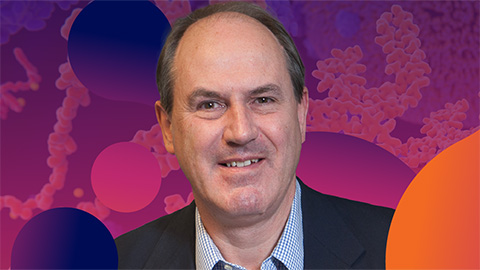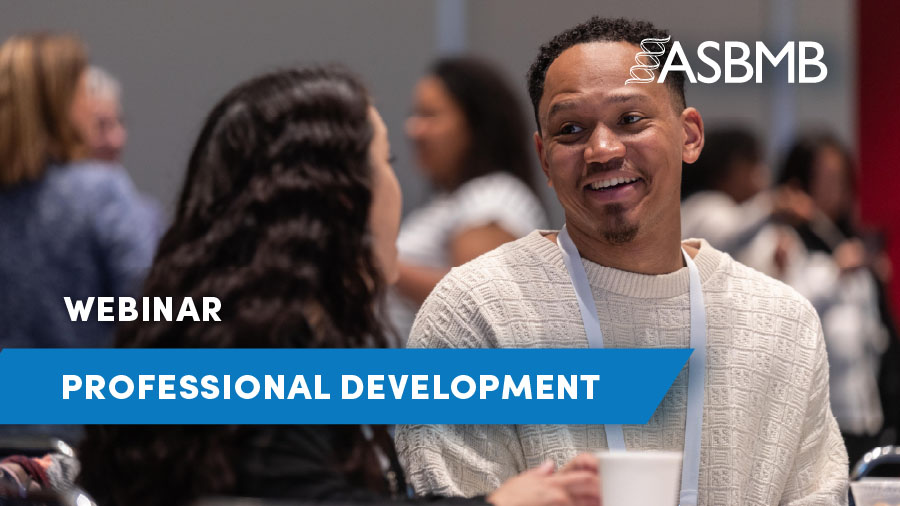Interest group sessions for your #DiscoverBMB itinerary
Interest group sessions at Discover BMB 2024 in San Antonio will bring together attendees with similar interests to share their recent findings, exchange ideas and establish connections.
The sessions will be held on the first day of the American Society for Biochemistry and Molecular Biology annual meeting, March 23, and feature speakers, discussion groups, breakouts and other types of networking activities.
The 2024 interest groups are described briefly below. Keep an eye on discoverbmb.asbmb.org for more details, including the speaker lineups.
Current understanding of DNA base excision repair pathway and its relevance to cancer

Organizers:
Zucai Suo, Florida State University College of Medicine
Patrick O'Brien, University of Michigan Medical School
Learn about the cutting-edge biochemistry, biophysics and cell biology techniques that will bolster your cancer biology studies. Speakers will discuss recent findings on the role of the DNA base excision repair pathway in cancer initiation and progression. Exchange ideas during roundtable discussions and casual networking.
O-GlcNAc regulation of cellular physiology and pathophysiology

Organizers:
Gerald W. Hart, University of Georgia
Lance Wells, University of Georgia
Dive into the world of O-GlcNAcylation of nuclear, cytoplasmic and mitochondrial proteins and the cellular stress response. Attendees will first get caught up to date with a short background talk on the roles of O-GlcNAc in survival/death signaling pathways and the regulation of autophagy. This will be followed by talks describing the latest on the mechanistic roles of O-GlcNAcylation in cancer and neurodegenerative diseases. Get your pressing questions answered during a short Q&A session as well as a panel discussion.
Membrane proteins

Organizers:
Francisco Barrera, University of Tennessee
Matthias Buck, Case Western Reserve University
Engage in discussion on proteins embedded in membranes. Speakers will discuss cryogenic electron microscopy structures of membrane receptors and transporters as well as single-molecule methods and molecular dynamics simulations. Make connections during an audience-driven Q&A session followed by an interactive, networking panel discussion.
International collaborations to promote global health Initiatives

Organizers:
James Mukasa Ntambi, University of Wisconsin-Madison
Edward Eisenstein, University of Maryland College Park
Join forces with researchers interested in providing sustainable agricultural, nutritional, health and educational interventions through service-learning and research to combat disease in developing nations. Speakers will cover how researchers can enhance their global engagement in areas such as epigenetics, genomics and proteomics. Network with researchers across biochemistry during a moderated Q&A session as well as a casual meetup.
RNA & gene regulation research at primarily undergraduate institutions

Organizers:
Megan E. Filbin, Metropolitan State University of Denver
Neena Grover, Colorado College
Meet RNA researchers at primarily undergraduate institutions and discuss approaches to make undergraduate research more accessible. Speakers will include members of the RNA@PUI Supergroup, who will share their undergraduate research projects. After the presentations, attendees can participate in an informal networking session to share ideas and establish collaborations.
Multifaceted mitochondria

Organizers:
Oleh Khalimonchuk, University of Nebraska-Lincoln
Laura L. Lackner, Northwestern University
Explore the diverse qualities of the mitochondria with scientists who study the powerhouse of the cell. Trainees and emerging investigator speakers will illustrate the intersection of basic mitochondrial biology and the molecular mechanisms of disease and aging. A short networking session will energize attendees and create synergy among researchers.
Signal transduction: an emergent behavior of biomolecular condensates

Organizers:
Josh Andersen, University of Utah
Carlos Castañeda, Syracuse University
Forge connections while discussing phase separation and cell signaling. Speakers will highlight how inhibition or activation of kinases and other enzymes, compartmentalization of enzymes and substrates/cofactors within the cell and posttranslational modifications regulate phase separation. Organizers will invite and help attendees to join a Slack community to keep in touch.
Emerging PTMs: AMPylationPlus Part II

Organizers:
Kim Orth, University of Texas Southwestern Medical Center
Anju Sreelatha, University of Texas Southwestern Medical Center
Shed light on AMPylation, a posttranslational modification that involves the addition of an adenosine monophosphate to protein substrates. Speakers will explore the biochemical mechanisms of enzymes that catalyze AMPylation, novel approaches to study AMPylation and the functional role of AMPylation in health and disease. Stick around and exchange ideas during a networking period.
Cryo-electron microscopy: from single particle to tomography

Organizers:
Elizabeth Wasmuth, University of Texas Health at San Antonio
John Jimah, Princeton University
Learn about cutting-edge advances in cryo-electron microscopy. Speakers will give an overview of the field and cover recent advances as well as developing methodologies for cryo-electron tomography and single-particle processing. Establish collaborations and get tips on your own cryo-EM work during a panel discussion and networking period.
Bridging cutting-edge innovation in mass spectrometry–driven proteomics between academic and industrial labs to elucidate novel biology in human disease

Organizers:
Mark R. Witmer, Bristol Myers Squibb
Cheng-Yu Chen, Bristol Myers Squibb
Join industry scientists and academic researchers for a discussion on how to strengthen the academic–industry interface. Speakers will discuss how researchers can use mass spectrometry–proteomic technology to expand capabilities and throughput for exploring new therapies. Talks from industry and academia experts will be followed by small group sessions to brainstorm new ideas.
TDP-43: from protein folding and structure to aggregation and importance as a biomarker

Organizers:
Fabrizio Chiti, University of Florence
Emanuele Buratti, International Centre for Genetic Engineering and Biotechnology
Get the latest insights on TDP-43 research, including a cryo-electron microscopy structure of TDP-43 isolated from patients. Speakers will discuss structural insights, the use of TDP-43 as a biomarker as well and the role of TDP-43 in neurodegenerative diseases. After short talks, attendees will have the opportunity to mingle, network and establish collaborations during a casual networking period.
Inter-organ communication in cellular and immune homeostasis

Organizers:
Narendra Kumar, Texas A&M University
Jayshree Mishra, Texas A&M University
Find out how organs communicate to maintain homeostasis. Speakers will explore the microbiota–gut–brain axis, gut–immune interactions, gut–liver axis, impact of DNA damage response on tissue crosstalk and signaling mediators of inter-organ communication. The short talks followed by panel discussions, Q&A and networking.
Nutrient sensing posttranslational modifications: metabolism and disease

Organizers:
Lauren Ball, Medical University of South Carolina
Fangliang Zhang, University of Miami Miller School of Medicine
Explore how posttranslational modifications contribute to health and disease. Speakers will cover the regulation of physiological and pathophysiological conditions by nutrient-sensing posttranslational modifications as well as emerging techniques to detect posttranslational modifications. After the talks, meet other investigators in the field during a networking period.
New advances in cardiovascular metabolic disease research

Organizers:
Mei-Zhen Cui, University of Texas Permian Basin
Yabing Chen, University of Alabama at Birmingham
Join your colleagues to learn about the latest discoveries in cardiovascular metabolic disease research. Speakers will discuss recent findings on cardiometabolic vascular stiffness and aging, aneurysm, vascular and microvascular function/dysfunction, macrophage sciences and signaling. Each talk will be followed up with a short, dynamic Q&A session. Network with cardiovascular researchers during a panel discussion and casual networking period.
Enjoy reading ASBMB Today?
Become a member to receive the print edition four times a year and the digital edition monthly.
Learn moreFeatured jobs
from the ASBMB career center
Get the latest from ASBMB Today
Enter your email address, and we’ll send you a weekly email with recent articles, interviews and more.
Latest in Careers
Careers highlights or most popular articles

Decoding how bacteria flip host’s molecular switches
Kim Orth will receive the Earl and Thressa Stadtman Distinguished Scientists Award at the ASBMB Annual Meeting, March 7–10, just outside of Washington, D.C.

Defining JNKs: Targets for drug discovery
Roger Davis will receive the Bert and Natalie Vallee Award in Biomedical Science at the ASBMB Annual Meeting, March 7–10, just outside of Washington, D.C.

Upcoming opportunities
No matter where you are in your career and what future path you aspire to, everyone needs leadership skills. Join ASBMB for practical strategies for building and practicing leadership skills.

Close out ASBMB 2026 with a bang
The closing reception of the 2026 ASBMB Annual Meeting will be held at the Torpedo Factory Art Center in Alexandra, Virginia.

Redefining lipid biology from droplets to ferroptosis
James Olzmann will receive the ASBMB Avanti Award in Lipids at the ASBMB Annual Meeting, March 7–10, just outside of Washington, D.C.

Creating change in biochemistry education
Pamela Mertz will receive the ASBMB William C. Rose Award for Exemplary Contributions to Education at the ASBMB Annual Meeting, March 7-10 in Washington, D.C.

